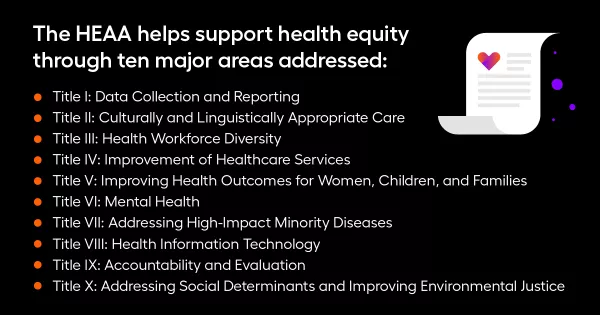How the HEAA tackles SDoH and advances health equity
The Health Equity and Accountability Act (HEAA) stands as a pivotal legislative framework aimed at achieving health equity for all individuals, regardless of their social determinants of health (SDoH). By recognizing the significant impact of SDoH on health outcomes, the HEAA underscores the importance of robust data and analytics in identifying disparities and implementing targeted interventions. Here, we’ll explore how the HEAA interacts with SDoH and emphasizes the role of data and analytics in combating health inequalities and fostering a more equitable healthcare system.

What is the HEAA, and what is health equity?
Passed in congress in 2022, the HEAA aims to reduce health inequity (or unequal access to and quality of healthcare). It changed eligibility requirements for Medicare and Medicaid, and it requires more detailed demographic and public health reporting. It also increases access to culturally literate, appropriate care across diverse communities.
By requiring more robust reporting, it puts data at the fore of an important conversation — if there was any doubt that information is integral to great care, this proves otherwise. It emphasizes the importance of data collection and analytics to identify population-level patterns, disparities, and barriers to healthcare access. By examining the interplay between SDoH and health outcomes, policymakers can design evidence-based interventions tailored to the specific needs of vulnerable populations.
What’s the relationship between health equity & SDoH?
SDoH encompass a range of social, economic, and environmental factors that influence an individual's health outcomes and access to healthcare services. Factors such as income, education, housing, employment, and access to nutritious food significantly impact a person's well-being, and if they’re isolated from one of these important resources, their health can decline accordingly. These disparities often result in marginalized communities facing increased risks of chronic diseases, reduced life expectancy, and limited access to quality healthcare.
Health equity is integrally tied to these factors — if social inequities perpetuate illness, then they need to be considered in the line of treatment. Health equity also acknowledges that things like illiteracy, a language barrier, or a lack of transportation could affect someone’s ability to find quality care.
Data analytics to advance health equity
Data collection and analytics play a crucial role in bringing the HEAA's goals to fruition. Robust data collection systems enable the identification of disparities in the first place, and from there, organizations can evaluate the efficacy of their interventions and track progress over time. By analyzing data from various sources, including electronic health records and EMRs, surveys, and administrative databases, the powers that be — at a government level, or in a healthcare organization’s board room — can gain insights into the impact of SDoH on health outcomes and identify areas of intervention.
The HEAA promotes the use of advanced analytics, such as predictive modeling and machine learning algorithms, to identify at-risk populations and design targeted interventions. These analytics tools can leverage vast amounts of data to generate actionable insights, allowing healthcare providers and policymakers to allocate resources more effectively and reduce disparities.
Collaborate, innovate, and achieve better population health
The HEAA emphasizes the importance of integrating data systems across sectors, including healthcare, social services, education, and housing. By creating interoperable data systems, policymakers can obtain a comprehensive understanding of individuals' social needs and coordinate efforts to address them effectively. Collaboration between healthcare providers, community organizations, and governmental agencies is vital to foster a holistic approach that tackles SDoH and promotes health equity.
Furthermore, the HEAA encourages the collection of disaggregated data, ensuring that health disparities within specific subpopulations are not overlooked. By capturing data on race, ethnicity, gender, income, and other relevant factors, policymakers can identify disparities and tailor interventions to meet the specific needs of marginalized communities.
Paving the road to a more equitable healthcare future
The Health Equity and Accountability Act is a vital step towards combating health inequities for its acknowledgement of how SDoH influence health outcomes. This representation at a national scale is a milestone — if we can all agree that social challenges impact health, we can work to find the root cause of population health woes.
Through data collection, analytics, and collaboration across sectors, the HEAA empowers policymakers and healthcare providers to design and implement evidence-based interventions that address the root causes of health disparities. By leveraging the power of data, the HEAA paves the way for a more equitable healthcare system that ensures all individuals have the opportunity to attain optimal health regardless of their social circumstances.
Learn more about how Arcadia's supporting health equity and eliminating SDoH barriers, one data point at a time.
